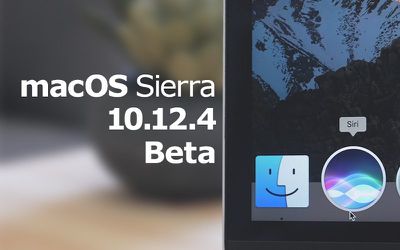Apple today seeded the second beta of an upcoming macOS Sierra 10.12.4 update to public beta testers for testing purposes, two weeks after seeding the first public beta and one day after releasing the second 10.12.4 beta to developers.
Beta testers who have signed up for Apple's beta testing program will receive the second 10.12.4 macOS Sierra beta through the Software Update mechanism in the Mac App Store.

Those who want to be a part of Apple's beta testing program can sign up to participate through the beta testing website, which gives users access to both iOS and macOS Sierra betas. Betas should not be installed on a primary machine due to the potential for instability.
macOS Sierra 10.12.4 brings iOS's popular Night Shift mode to the Mac, allowing users to cut down on blue light exposure in the evening. Believed to affect sleep by upsetting the body's circadian rhythm, blue light is thought to be more harmful than yellow light.
With Night Shift, the Mac's display automatically shifts from cool to warm at sunset and then shifts back at sunrise. Users can also set custom times for the display's colors to shift, or toggle the effect on manually. A Toggle to turn Night Shift on is available in the Notification Center, and Siri can also be used to activate the feature.
macOS Sierra 10.12.4 also includes Shanghainese dictation support, cricket scores for Siri, improved PDFKit APIs, and iCloud Analytics options.























Top Rated Comments
In keeping with Tim's obsession with profits, Apple is concentrating on the big moneymakers, and the Pro market being so small compared to the revenue generated by the iPhone and iOS ecosystem, only seems to get sporadic love nowadays. Even the consumer Mac lines, both desktops and laptops, sometimes seem to be treated like 'the ugly stepchild'.
And one cannot any longer blame this on Apple's earlier mantra of only doing updates when warranted by significant improvements, rather than upgrading for upgrade's sake. That model appears to have long since been abandoned, and Apple now claims they depend totally on the availability of new chips or suitable graphics cards, while we all know these parts are sometimes available months before being introduced in Apple products, and in some cases skipped altogether for the next gen.
Judging from the frequent comments on sites like these, many Mac users would like more frequent Mac updates, at the very least with the latest processors and graphics (so that if and when a user does decide to purchase new equipment, he/she doesn't have to choose between waiting and waiting and waiting, or paying premium prices for 6mos old tech), a return to post-purchase upgradeability, and minimized obsolescence, but none of the above is likely to happen. The industry trend is in the opposite direction.
In spite of employing thousands upon thousands of employees (well over 100,000 if AppleStore employees are included), could it be that with the existing product line-up, the various Stores, the health initiative, HomeKit, Maps, AppleMusic, AI, AR, their TV ambitions, the Car initiative, self-driving Tech, and the new, nearly completed campus, Apple is just spreading itself too thin?
I realize Apple can not be all things to all people, but sometimes I secretly miss the old Apple.
You could say Apple "sherlocked" f.lux.
My hope for Sierra was, since it didn't have that many features, that it would be a new Snow Leopard. Focus on smashing bugs, getting rid of excess fat and making it into a worthy competitor for Snow Leopard, IMO, the best OS X version yet.
It seems to me that Sierra has many under the hood changes, for the purpose of aligning the code base between IOS and MacOS, and Apple is keeping the goodies for when the merge/alignment has been completed. Fingers crossed :D
Now that you mention APFS. I am looking forward to see how it will play out. Do we really need machines with 32GB's of RAM if we can get Optane "harddrives" and a filesystem that is built for Flash storage. A filesystem that makes the old divide between super fast RAM and super slow spinning disks a thing of the past?
Good things are surely coming our way ;)
I really hope that Apple is going all in on 10.13 or 11.00.
Update: This turned out to be a problem with Kaspersky for Mac. After removing it, MacOS came up just fine.